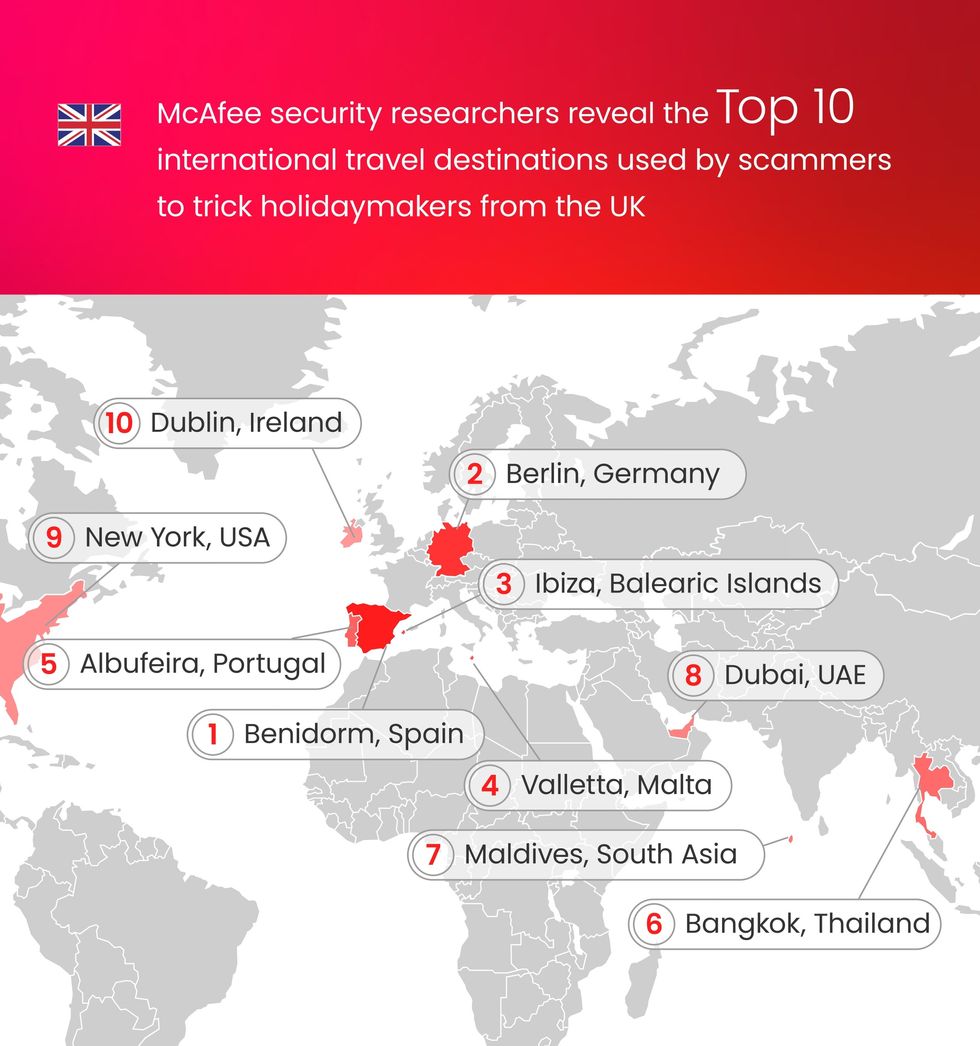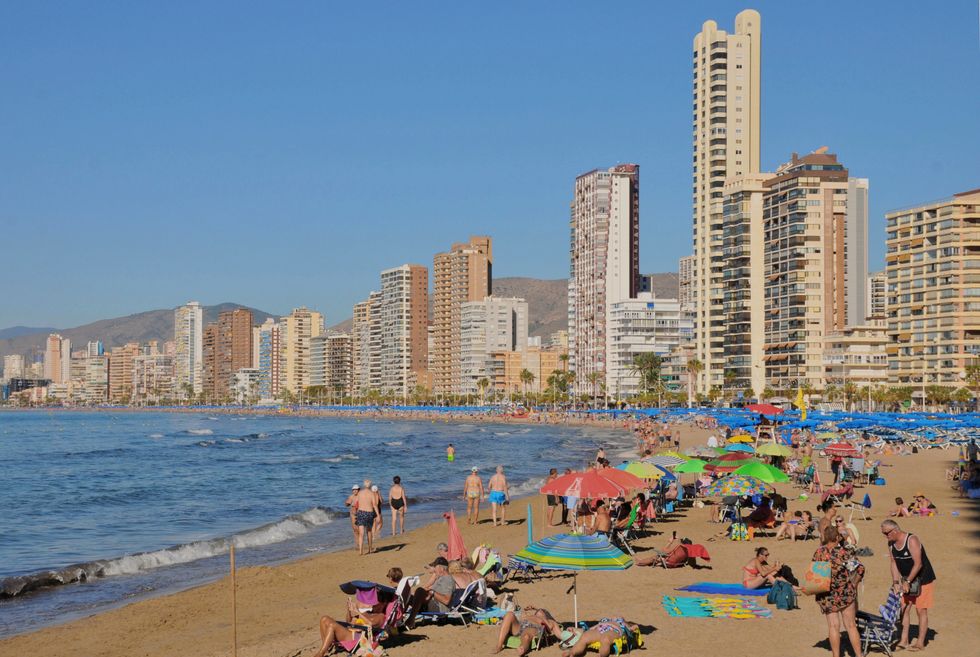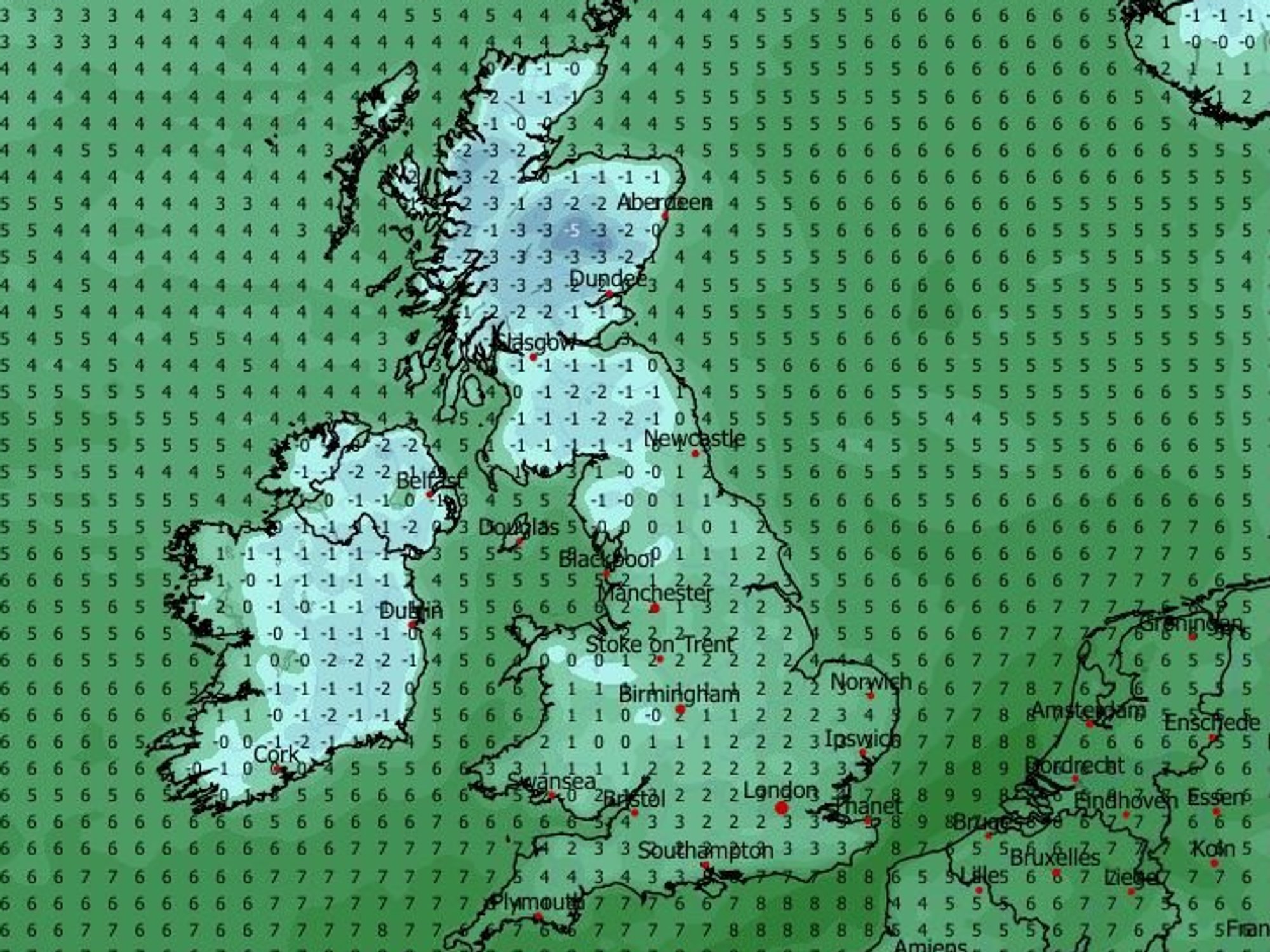Mapped: 10 most dangerous holiday destinations — beware of scams and fake travel deals, experts warn

With millions of Britons looking to book a summer getaway, hackers have centred their attacks on 10 of the most popular destinations — launching fake websites, malicious adverts on social media, and worse
|
Holidaymakers were scammed out of £12 million last year, Action Fraud figures reveal
- Hackers are looking to capitalise on the rush to book summer holidays
- McAfee experts have pinpointed the 10 most scam-prone hotspots
- Britons have been warned to be especially careful when shopping online
Don't Miss
Most Read
Latest
All products are independently selected by our experts. To help us provide free impartial advice, we will earn an affiliate commission if you buy something. Click here to learn more
British holidaymakers lost over £12 million to scams last year. To stop cyber criminals from pulling off the same feat this summer, security researchers have shared a list of the 10 holiday destinations most likely to be used to entice unsuspecting British holidaymakers into scams.
Benidorm is the top target for scam artists hoping to separate Britons from their hard-earned cash, experts from antivirus firm McAfee have claimed. The Spanish resort in the Costa Blanca region boasts the greatest number of websites and ads offering fake deals. Benidorm has skyrocketed from ninth place on the list last year.
- View Deal | Encrypt everything you do with NordVPN — get 3 months FREE
- View Deal | Surfshark monitors Dark Web, sends alerts if your data is breached
- View Deal | Unique passwords for EVERY login with 1Password — start for free
Berlin and Ibiza follow the Mediterranean destination in second and third spot, researchers warned. Meanwhile, the most scam-prone destination from the 2023 list — Bangkok — is now the sixth.

Researchers at McAfee have identified the 10 most-scam prone destinations for Britons looking to travel abroad this summer
|MCAFEE | GBN
GB News and McAfee have put together a map of the top 10 most dangerous destinations, so holidaymakers will know to be on high alert when researching accommodation, package deals, and flights this summer.
If you're trying to spot scams this summer, be wary of fake accommodation listings and too-good-to-be-true holiday deals on email and social media, McAfee Head of EMEA Vonny Gamot told GB News.
If you're trying to book one of the destinations on this list, you'll need to extra careful when booking your summer jaunt, whether you're looking to travel by flight, hotel, rental car, or a package offer.
Vonny Gamot said: “Staying alert and taking early and proactive steps to manage your security, privacy and online identity is extremely important as we head into the peak summer holiday season. If a deal sounds too good to be true, it’s best to avoid clicking; instead, go direct to the source and book with reputable companies.
“Additionally, with the use of AI, scams are becoming even more sophisticated, making it harder for consumers to tell what’s real and what isn’t online. Traditional hallmarks of scams, such as misspelled words and poor grammar, are becoming a thing of the past but one crucial telltale sign remains – a pressure to act fast.
"Is it your last chance to buy tickets? Is there a ‘huge deal’ for one day only? Cybercriminals use this tactic to try and catch you with your guard down. Pay close attention to any enticing holiday offers online, particularly for Benidorm, Berlin, and Ibiza, as these are top destinations used by cybercriminals to lure you into disclosing personal information or clicking on malware-infected links."
Top 10 Most ‘Dangerous’ Destinations in 2024
- Benidorm, Spain
- Berlin, Germany
- Ibiza, Balearic Islands
- Valletta, Malta
- Albufeira, Portugal
- Bangkok, Thailand
- Maldives, South Asia
- Dubai, UAE
- New York, USA
- Dublin, Ireland
When shopping for summer holidays online, there are a few precautions you can take to safeguard against scams.
First up, don't believe a website or social media post just because it looks slick and polished.
Fake websites often rely on a professional, modern design to fool you. Reviews aren't always trustworthy either, as websites can stack positive reviews or delete bad reviews altogether. It's always worth checking a third-party website, like Trustpilot, or social media to take the temperature of a website that you're unfamiliar with.

Famed for its nightlife and large cohort of expats, Benidorm is one of the most popular destinations for Britons looking to sun themselves
| FLICKRLastly, while everyone loves a great deal ...if something seems suspiciously cheap, then it could be a sign that something is awry, especially if it's only available from an online retailer that you've never heard of before. If you're concerned about the legitimacy of a website, then don't hand over your personal information, including credit or debit card information, home address, email, and birthdate.
- View Deal | Encrypt everything you do online with NordVPN — and get 3 months FREE
- View Deal | Surfshark monitors the Dark Web and send alerts if your data is breached
- View Deal | Use unique passwords for EVERY login with 1Password — start for free
Using an antivirus or VPN can be a good way to bolster security when shopping online for a holiday. The best VPNs work by shielding everything you do online with military-grade encryption, so malicious websites can't keep tabs on your online activity or location data.










